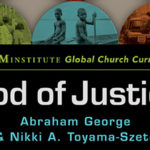Posted: 2/01/08
Rogers challenges churches
to engage in justice issues
By Jeff Huett
Baptist Joint Committee for Religious Liberty
ATLANTA—Participants at a session held in conjunction with the New Baptist Covenant celebration in Atlanta received a lesson in “going upstream” to address the root causes of injustice.
Melissa Rogers, a visiting professor of religion and public policy at the Wake Forest University Divinity School in Winston-Salem, N.C., led a special interest session that focused on matters at the intersection of faith and public policy.
To illustrate the distinction between one-on-one church ministries, which many churches engage, and seeking justice, Rogers told a story about a man standing on the side of a river and saving people one-by-one until finally deciding to go upriver to figure out who was throwing the people in the river.
| • See latest photos and the latest video clips from the New Baptist Covenant Meeting. (And go here to see our complete coverage of the event). |
“The discussion today is about going upstream,” Rogers said.
Just like food pantry, soup kitchen and other ministries that churches undertake, Rogers said it was important to be heard on issues such as advocating just economic policy, reforming the criminal justice system and pushing for sound environment polices.
“We should certainly bring our faith to bear on these questions,” Rogers said.
The Old Testament prophets Micah and Amos—as well as Jesus Christ’s example in the Gospels—demonstrate the biblical justification for personal involvement in the justice issues, she said. Prophets confront unjust social structures, she noted.
In addressing what she calls a false dichotomy fostered by those suggesting that ministers must choose between one-on-one ministries and justice issues, Rogers highlighted the African-American church, which she said has shown that there need not be a choice.
On the decision to enter the public policy arena, Rogers quoted religion scholar Martin Marty: “In the political world, not to be political is political.”
“That is to say, if you are silent, you create a political vacuum and that vacuum will be filled by something,” Rogers said. “We need voices from a perspective of a cause that is greater than ourselves to fill the vacuum.”
Rogers then offered principles to help participants navigate the sometimes perilous faith and politics intersection.
“While Christians can have disagreements about public policy issues,” she said, “we would be blind, deaf and dumb in today’s politics not to see the risks of religious engagement in public policy.”
In quoting former Representative Barbara Jordan of Texas, Rogers warned that “we are God’s servants, not his spokespeople.” Secondly she said religious groups should practice prophetic politics, not partisan politics.
“Is it really so difficult to see that no political party conducts itself in a manner that Jesus would?” she asked.
Additionally, “we must not let our faith be used,” Rogers said, drawing on a sermon by Martin Luther King, Jr., when he said that “the church must be the conscious of the state, not its tool.”
She also suggested that the separation of church and state and religious liberty should be at the forefront. “When we work on public policy issues, we should work for the common good and not for the establishment of Christendom,” she said.
After all, “the only faith that can call government to account … is the one that is seriously independent from government,” she said.














We seek to connect God’s story and God’s people around the world. To learn more about God’s story, click here.
Send comments and feedback to Eric Black, our editor. For comments to be published, please specify “letter to the editor.” Maximum length for publication is 300 words.